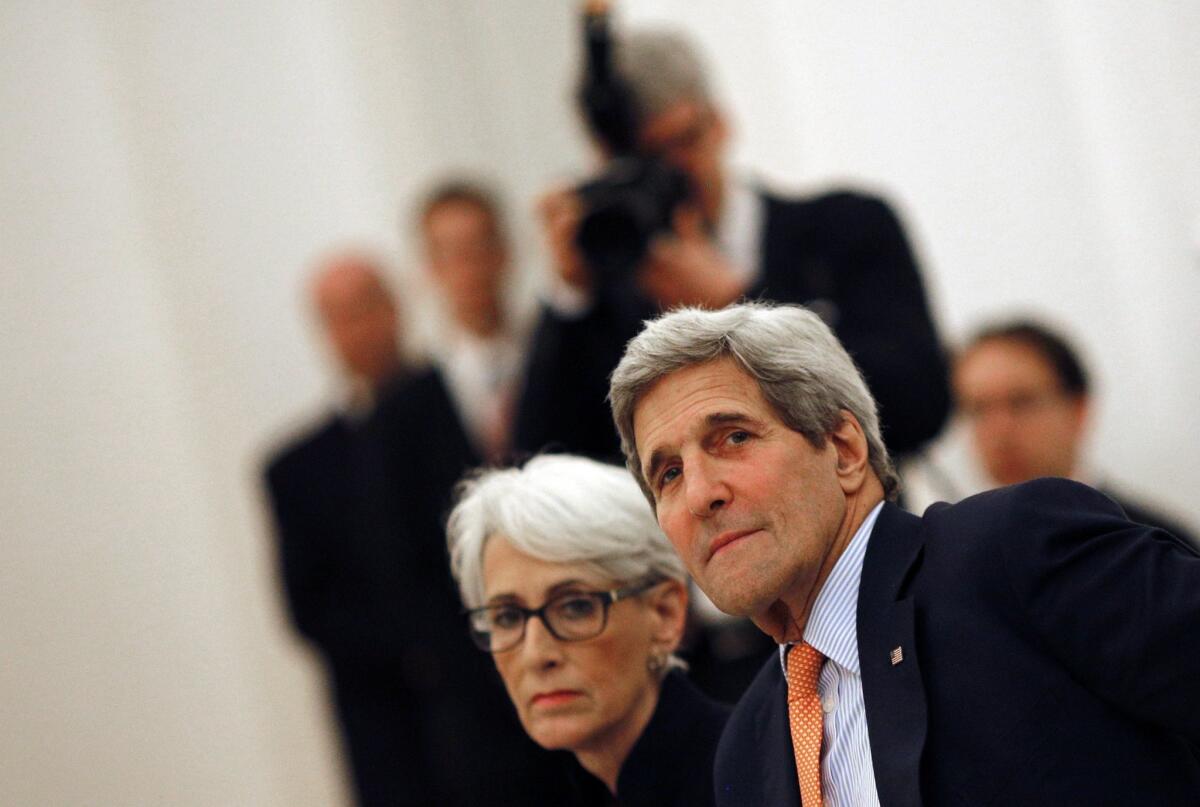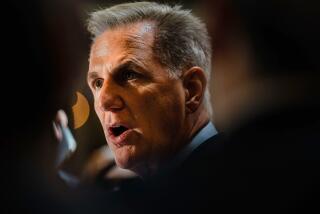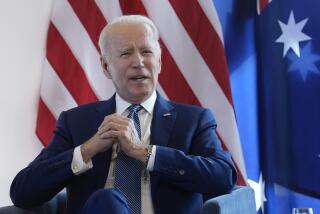Iran nuclear talks extended again; Friday new deadline

U.S. Secretary of State John F. Kerry and Undersecretary of State Wendy Sherman meet with foreign ministers at a hotel in Vienna on Tuesday to discuss Iran’s nuclear program.
- Share via
Reporting from Vienna — Six leading world powers and Iran acknowledged that they would miss a midnight Tuesday deadline for wrapping up a comprehensive nuclear deal, forcing them to extend talks for the fifth time in the last year.
Diplomats who last week emphasized the urgency of finishing work by the deadline said the important goal now was producing a sound deal. They set a new deadline of Friday, but acknowledged they were not certain when the work would be concluded.
“We’re more concerned about a quality deal than we are about the clock,” said Marie Harf, strategic communications advisor to Secretary of State John F. Kerry. “We’ve made substantial progress in all areas, but this work is highly technical and there are high stakes for all the countries involved.
“We are taking these negotiations day to day,” she said.
Missing the latest deadline means that the Obama administration may also fail to meet a congressional deadline of midnight Thursday for transmitting the deal and supporting documentation to lawmakers. If that deadline is broken, the period that Congress has given itself to review the deal will be extended to 60 days from 30 days.
The administration has been eager to meet that deadline, fearing an extension would allow time for critics to maneuver to undermine the agreement. But officials have said in recent days that missing the deadline would not be a serious setback.
Some of the foreign ministers who had arrived in the Austrian capital Sunday and Monday to try to resolve politically sensitive issues began to leave. Kerry, Iranian Foreign Minister Mohammad Javad Zarif and European Union foreign policy chief Federica Mogherini said they would stay to continue work on the document and its voluminous technical annexes.
Iran and the six world powers -- the United States, France, Britain, Germany, Russia and China -- are seeking a deal that would ease sanctions on Iran if it agrees to restrictions aimed at preventing it from obtaining a nuclear bomb.
Diplomats have said since this round began June 26 that they had narrowed the remaining issues to three or four. Russian Foreign Minister Sergei Lavrov said Tuesday that the remaining issues were now “less than 10.”
The negotiators missed deadlines in July and November of last year, and in March and June of this year. The negotiations have always moved ahead and are now closer to completion than they have ever been.
But the failure to complete the deal is fodder for critics in Washington who contend Iran is playing for time.
U.S. officials have accused Iran of using the deadline to try to build pressure for concessions. On Monday, Iranian raised an issue that apparently previously had not been a high priority: its desire to end, as part of the agreement, United Nations arms and missile embargoes on Iran.
Both Kerry and Zarif in recent days have made public comments suggesting the other side was obstructing progress in the days before the deadline. Kerry said Sunday the U.S. team was ready to leave the bargaining table if Iran’s terms didn’t meet requirements.
The weariness of negotiators is another issue, say people close to the talks. The top diplomats, including 71-year-old Kerry, have endured a punishing schedule of round-the-clock meetings. The technical staffs also have been working steadily for months.
Follow @richtpau on Twitter for news out of the Iran talks
More to Read
Sign up for Essential California
The most important California stories and recommendations in your inbox every morning.
You may occasionally receive promotional content from the Los Angeles Times.











